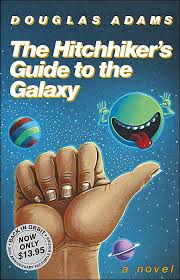Some Unhelpful Remarks from the Author
One night in 1971, a man was lying in a field outside the Austrian town of Innsbruck, mostly because he was too drunk to be standing in the field. From that position, this penniless hitchhiker stared into the night sky and wished someone had written a hitchhiker’s guide to the galaxy so that he could pick up and leave the planet. Many years and a great number of baths later, this man, Douglas Adams, would pitch an idea for a sci-fi comedy radio show to the BBC.[1] Work on this show eventually brought back to his mind that random, drunkenly-generated idea for some kind of guide that could help travelers see the marvels of the universe without all the marvelous expense, and so The Hitchhiker’s Guide to the Galaxy was born.
The story follows a regular Brit named Arthur Dent who wakes up one Thursday to discover that Ford Prefect, his best friend of the last 15 years, was actually an alien researcher for The Hitchhiker’s Guide to the Galaxy and that the Earth was about to be destroyed to make way for a hyperspace express route. Arthur, rescued off the planet by Ford at the last possible moment, then has to figure out how to make his way through a rather bizarre galaxy with just his wits, the bathrobe he put on that morning, no towel, and Ford’s battered copy of that “wholly remarkable book.”[2] And what was, perhaps, the most helpful thing about that guide? The fact that it featured the words “Don’t Panic” written in large, friendly letters on the cover.
who wakes up one Thursday to discover that Ford Prefect, his best friend of the last 15 years, was actually an alien researcher for The Hitchhiker’s Guide to the Galaxy and that the Earth was about to be destroyed to make way for a hyperspace express route. Arthur, rescued off the planet by Ford at the last possible moment, then has to figure out how to make his way through a rather bizarre galaxy with just his wits, the bathrobe he put on that morning, no towel, and Ford’s battered copy of that “wholly remarkable book.”[2] And what was, perhaps, the most helpful thing about that guide? The fact that it featured the words “Don’t Panic” written in large, friendly letters on the cover.
When I decided not to ask my students to pay lots of money for a very expensive writing textbook,[3] I had to sit down and figure out what they would be missing without it. And while I knew they would have excellent guidance from another open-education textbook on writing I would be using,[4] I noticed that they would no longer have any real, explicit discussion of the different essays they would be writing in class. And so, I sat down and wrote out everything I thought that they would need to know.[5] Then, though, I had to figure out what to call the thing, and being a huge fan of the entire Hitchhiker’s trilogy of five books[6] and desiring to provide a calming and comforting presence for students who may be forced to tackle tasks that cause them no inconsequential amount of anxiety, I simply embraced my nerdy love of the Guide and straight up ripped off the whole theme.
So, now you’re enrolled in ENGL 1010 and have this rather affordable Guide in front of you, and it’s time to make some use of it. My goal with this text is to introduce you to the different essay genres you’ll be working with this semester, the distinctive elements that define each style, the rubrics I use to assess your writing and the criteria you’ll have to meet, the questions that students tend to ask semester after semester, and the most common mistakes that I’ve seen in the essays they end up submitting. In short, I hope to give you everything you need to make a decent stab at becoming a better writer and passing the course.[7]
After using this book with my students for a year, I got some helpful feedback about what was working and what might have been missing. I spent the summer of 2024 adding a section briefly covering the basics of the two most popular academic citation styles. In addition, students had requested some explanations of grammar, punctuation, and capitalization,[8] so I dedicated a section at the end to that topic. Finally, at our university’s spring 2024 teaching and learning conference, I attended an inspiring presentation that was given by one of my colleagues. She explained that research had shown that, when people with dyslexia listened to an audio recording of a text as they read it, they were able to process it and understand it better. I have had a number of students mention that they struggled with dyslexia and that that affected how they felt about writing, and so it seemed like producing an audio version of the book would be an obviously logical next step. You’ll see those recordings posted at the top of each chapter.[9]
Unfortunately, just as the original Hitchhiker’s Guide had “many omissions” and implausible stories and was “wildly inaccurate,”[10] this Guide, too, likely has plenty of problems. If you encounter any issues at all, please email me. This could be anything from a grammatical error or mistyped word to an unhelpful or unclear explanation, from a broken link to even a pop-culture reference that is so outdated that no one born in this millennium could be expected to understand it. As an entirely digital publication, I can very easily make quick changes and would appreciate the chance to at least pretend towards some degree of professionalism. I am, proactively, very grateful for all of your feedback.
So, it’s time to jump in, start writing, and most importantly…

- British Broadcasting Corporation ↵
- Page 6, The Ultimate Hitchhiker’s Guide to the Galaxy: Five Novels and One Story, by Douglas Adams, published by Harmony Books, 2010. ↵
- Albeit an expertly-written and high-quality writing textbook. ↵
- The Art of Academic Writing, by Mike Peterson, Ph.D. ↵
- Awesome. Done. You’ve got that. ↵
- Read that phrase again. Slowly. You’ll get there. ↵
- Even if you only really care about one of those things. ↵
- Well, they didn’t ask me for them per se, but their writing was begging for some help in those areas. ↵
- Apologies to those students of mine who listen to me in class all day and then go home to listen to me blather on there as well. I am so sorry. ↵
- Page 6, The Ultimate Hitchhiker’s Guide to the Galaxy: Five Novels and One Story, by Douglas Adams, published by Harmony Books, 2010. ↵

